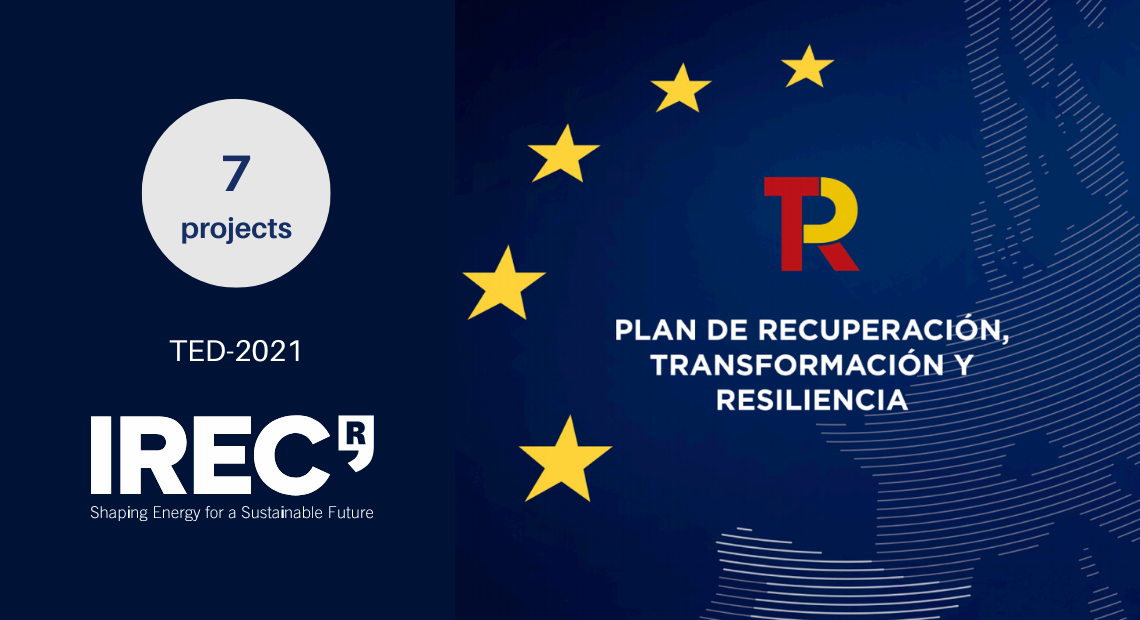IREC researchers have earned seven “Strategic Projects Aimed at Ecological Transition and Digital Transition” 2021 (TED 2021), which are intended to promote R&D&i activities to increase the competitiveness and international leadership of Spanish science and technology through the generation of scientific knowledge and quality research aimed at the ecological and digital transition.
The ecological transition is based on the following environmental objectives: mitigation of climate change, adaptation to climate change, sustainable use and protection of water and marine resources, circular economy, prevention and control of pollution and protection and recovery of biodiversity and ecosystems. The projects will pursue one or more of these environmental objectives by generating scientific knowledge, developing technologies, or supporting environmental policies, applied to productive activities, the protection of natural resources, people’s quality of life and of society.
The digital transition aims to strengthen the infrastructures, skills and technologies necessary for a digital economy and society, through the digitalization of the entire value chain in driving sectors, taking full advantage of the synergies and opportunities of new technological and data management developments, using disruptive digital technologies, and placing people and their digital rights at the center of this transition.
IREC groups lead four coordinated projects, and two individual projects, in addition to one participation. The list is the following:
- 3D-printed all solid state li-ion batteries (3D-ASSET). Alex Morata (Nanoionics and Fuel Cells group, IREC) is the coordinator of the consortium with the sub-project “Development of next generation all-solid-state lithium batteries by 3D printing combined fabrication techniques” (ALLIANCE), while Jordi Jacas (Energy Storage, Harvesting and Catalysis group, IREC) leads the sub-project “Stable olivine cathode materials with high specific energy for solid state batteries” (OLiBat). The consortium is formed by IREC (leader), CICenergigune, University of Castilla la Mancha and University of Barcelona.
- Integration and aggregation of energy communities with the Distribution Network (OptiREC). Cristina Corchero and Josh Eichman (Energy Systems Analytics group, IREC) are coordinators of the consortium formed by IREC (leader), University of Girona, Instituto de Investigación Tecnológica (IIT) and UPC.
- SIMulation assisted optimization of high Pressure solid oxide ELectrolysis Cells (SIMP-EL). Albert Tarancón and Marc Torrell (Nanoionics and Fuel Cells group, IREC) are coordinators of the consortium with the sub-project “HIgh Pressure 3D printed solid oxide Electrolysers” (HIPE). The consortium formed by IREC (leader), Instituto de Nanocienia y Materiales de Aragón and the Barcelona Supercomputing Centre.
- Functionalized indium-free transparent electrodes based on hybrid metal-oxide architectures for high performance optoelectronic devices (TransEL). Alejandro Pérez Rodríguez and Maxim Guc (Solar Energy Materials and Systems group, IREC) are the coordinators of the consortium with the sub-project “Development of high conductivity and high transparency electrodes for optoelectronic applications based on stacked hybrid metal-oxide nanolayer architectures”. The consortium formed by IREC (leader), UPC and University Pablo de Olavide.
- Cell level integration of power electronics and sensing for enhanced controllability, reliability and performance of future batteries (Cell Manager). This is an individual project led by Lluis Trilla (Power Systems group, IREC)
- One-stage syngas to Sustainable Aviation Fuel unit from electrolyzed CO2 (CO2SAF). This is an individual project led by Joan Ramon Morante and Jordi Guilera (Energy Storage, Harvesting and Catalysis group, IREC)
All projects start in December 2022 and will run for 2 years.
Acknowledgements (in Spanish):
Los proyectos TED2021-131365B-C41, TED2021-129663B-C51, TED2021-129758B-C31, TED2021-132864A-I00, TED2021-131267B-C31, TED2021-129663A-C53, TED2021-132365B-I00, están financiados por MCIN/AEI/10.13039/ 501100011033 y por la Unión Europea “NextGenerationEU”/PRTR”.




